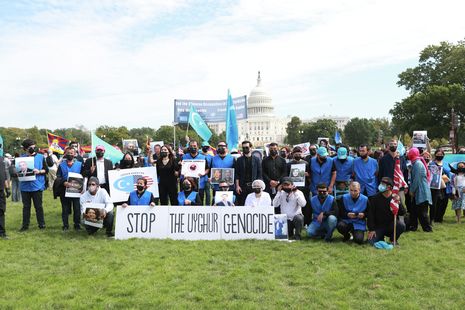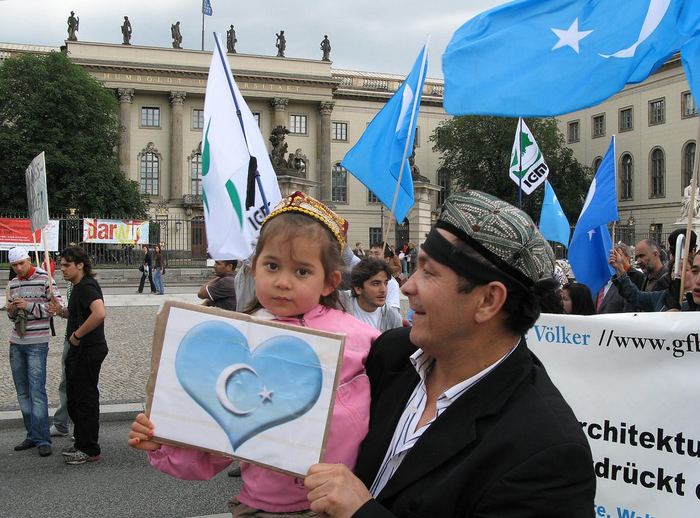Cambridge academics express solidarity with Newcastle academic sanctioned over Uighur research
The ‘blacklisting’ of the academic has led to concerns over the ‘grave threat to academic freedom’ which China’s actions pose

Content note: This article contains discussion of the detention and treatment of Uighur muslims, and brief mention of sexual abuse and torture
Several Cambridge academics have signed an open letter, published by the Times yesterday (29/03) which denounces China over concerns about the “grave threat to academic freedom.” The letter responds to Newcastle academic Dr Joanne Smith Finley being ‘blacklisted’, and subsequently banned from entering China and working with its institutions.
The letter, signed by 420 academics from across the world, shows solidarity with the Newcastle academic, who is one of ten figures and organisations to be ‘blacklisted’, including the former leader of the Conservative party Iain Duncan Smith.
The spreading of “lies and disinformation” about human rights abuses in Xinjiang is cited as the motive behind this.
This comes shortly after Britain joined several countries in imposing sanctions on Chinese officials in response to their alleged involvement in the persecution of the Uighurs in China’s Xinjiang region.
Finley, as a Reader in Chinese studies, has focused on Uighurs, Xinjiang, and Ethnopolitics in her research. She has suggested that more than one million Uighurs have been subject to “thought transformation” and forced labour in China’s high-security prisons. China has continually denied these claims of genocide.
As well as expressing solidarity with Finley, academics also “assert our commitment to academic freedom.” The letter deems China’s actions “a threat to universities’ core principle of academic freedom,” and states that China’s attempts to “silence critics outside its territory” will lead to “UK scholarly co-operation with China [being] rendered very difficult, if not impossible.”
In the letter, academics “call on the government and all UK universities to do likewise” by showing solidarity with Finley and defending “academic freedom.”
The MPs and other British citizens sanctioned by China today are performing a vital role shining a light on the gross human rights violations being perpetrated against Uyghur Muslims.
- Boris Johnson (@BorisJohnson) March 26, 2021
Freedom to speak out in opposition to abuse is fundamental and I stand firmly with them.
Professor Mary Laven, a lecturer with the Faculty of History and fellow of Jesus College, was among the academics who wrote the letter. Discussing her role in the letter with Varsity, Laven said that “it is clearly imperative that disinterested academics continue to undertake research into the treatment of Uighurs and other Turkic Muslims in China” and emphasised the need to “defend the vocation of academics to pursue the truth.”
She added that “the long list of signatories from across the UK, including a number of experts on China, suggests the extent of feeling on this issue.”
Five further Cambridge academics are among the signatories of the letter from prominent universities, such as Oxford, Yale and Harvard, who are concerned about the “serious escalation” of China’s actions.
Among these five is Dr Christopher Hann, a fellow at Corpus Christi and social anthropology specialist, who told Varsity that “many academics are denied visas for China - Jo is not the first and she will not be the last.”
Hann and his wife published a book last year on the topic of Uighur Muslims, entitled ‘The Great Dispossession,’ following several visits to Xinjiang. In the book’s preface, the pair recall visiting for the first time in 1986, but since their last visit in 2013, “conditions have deteriorated further.”
In the book, the pair “focus on documenting aspects of Uyghur society and lifeworlds in Xinjiang as we knew them in happier times, in conditions that were never entirely straightforward either for local people or foreign researchers (who have always been subject to close monitoring) but which were incomparably more relaxed than those of the present decade.
“We can only hope that, sooner or later, the vicious pendulum we have identified in state policy will swing back towards tolerance, recognition and mutual understanding.”
Meanwhile, Nick Megoran, one of Finley’s colleagues at Newcastle University, emphasised that the letter was a “determined fightback” against Chinese attempts to “bribe dozens of countries into remaining silent about gross human rights abuses in Xinjiang.”
Renewed attention has been given to the estimated one million Uighur Muslims detained in Xinjiang’s “re-education centres” following an investigative piece by the BBC published last month.
The investigation revealed details of the sexual abuse and torture endured by women in Xinjiang camps through a series of testimonials. One woman, who was detained in these camps for 18 months, told the BBC: “You can’t tell anyone what happened [...] it is designed to destroy everyone’s spirit.”
China has continually stated that what they call “vocational education” centres had been set up as part of the country’s anti-terrorism efforts.
Professor Smith Finley is the only academic among the ten groups and individuals affected by the sanctions: these groups include the China Research Group, the Conservative Human Rights Commission and Essex Court Chambers, which, following consultation with the World Uighur Congress, supported the view that a genocide was occurring.
Former Conservative leader, Iain Duncan Smith, who is also among this group, tweeted: “It’s our duty to call out the Chinese Govt’s human rights abuse in #HongKong & the genocide of the #Uyghurs. Those of us who live free lives under the rule of law must speak for those who have no voice. If that brings the anger of China down on me, I’ll wear that badge of honour.”
Prime Minister Boris Johnson has also spoken out in solidarity with these groups: “The MPs and other British citizens sanctioned by China [...] are performing a vital role shining a light on the gross human rights violations being perpetrated against Uighur Muslims,” he said.
“Freedom to speak out in opposition to abuse is fundamental and I stand firmly with them.”
Meanwhile, British foreign secretary Dominic Raab, announced a package of responsive actions against China, taking the form of asset freezes and travel bans on four senior Chinese politicians and officials as a result of their role in overseeing Uighur prisons.
Responding to the sanctions against Britons, the Foreign Secretary said: “It speaks volumes that, while the UK joins the international community in sanctioning those responsible for human rights abuses, the Chinese government sanctions its critics.
“If Beijing wants to credibly rebut claims of human rights abuses in Xinjiang, it should allow the UN high commissioner for human rights full access to verify the truth.”
 News / CUP announces funding scheme for under-represented academics19 December 2025
News / CUP announces funding scheme for under-represented academics19 December 2025 News / SU reluctantly registers controversial women’s soc18 December 2025
News / SU reluctantly registers controversial women’s soc18 December 2025 News / Cambridge welcomes UK rejoining the Erasmus scheme20 December 2025
News / Cambridge welcomes UK rejoining the Erasmus scheme20 December 2025 Features / Should I stay or should I go? Cambridge students and alumni reflect on how their memories stay with them15 December 2025
Features / Should I stay or should I go? Cambridge students and alumni reflect on how their memories stay with them15 December 2025 Film & TV / Timothée Chalamet and the era-fication of film marketing21 December 2025
Film & TV / Timothée Chalamet and the era-fication of film marketing21 December 2025











